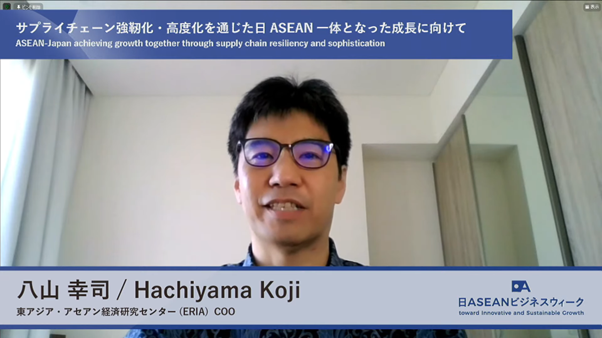ERIA's COO Discusses ASEAN-Japan Growth Through Supply Chain Resiliency and Sophistication
Share Article:
Print Article:
Tokyo, 3 June 2022: The ASEAN region has long been central in international business for Japanese companies, and the environment has undergone significant changes in recent years. Following last year’s first seminar, this year’s ASEAN-Japan Business Week explored the latest developments and future possibilities for ASEAN business. The series also gave concrete examples of initiatives from the leading companies and provided a wide range of expert discussions from various fields on issues and measures to accelerate and expand the initiatives.
The five-day event was officially started on Monday, 30 May 2022. Mr Koji Hachiyama, the Chief Operating Officer of ERIA, participated as one of the speakers on the fifth day, on Friday 3 June 2022. The theme of this last day was the situation of Japanese companies entering the ASEAN market and the latest business trends in ASEAN.
Opening Session
The session was opened by Mr Hara Noriyuki, Chair, Committee on Asia and Oceania, Keidanren Representative Director, Chairman of the Board, Mitsui Sumitomo Insurance Co., Ltd. He mentioned that in June last year, Keidanren released policy recommendations on Japan-ASEAN relations in the new era, to further promote the collaboration and co-creation between ASEAN and Japan. The recommendations touch on healthcare, safety aspects, social capital improvement for boosting connectivity, and the realisation of sustainable growth. He also acknowledged the ‘heart-to-heart’ of ASEAN-Japan Friendship and Cooperation that will reach another milestone of its 50th anniversary next year and hoped that it could be the guide for ASEAN-Japan relations in the future.
Mr Hirako Yuji, Japan Association of Corporate Executives/Asia Project Team, Chairman ANA Holdings Inc. Member of the Board, Vice Chairman, expressed his gratitude to all the speakers and the high calibre of the presentations at the event which provided great learning opportunities. He mentioned that Japanese companies can exchange views with ASEAN startups. He explained that there are factors affecting the progress of Japanese companies, such as pricing and the speed of decision-making speed. ASEAN-Japan B-2-B relations could promote the evolution of economic partnership and co-creation for innovation.
Presentations
In the morning session, Mr Koji Hachiyama presented on the topic of ASEAN-Japan achieving growth together through supply chain resiliency and sophistication.
He introduced ERIA activities which covers mainly economics, research, and policy recommendations. Mr Hachiyama explained that in general, the international production networks in ASEAN and East Asia are robust and resilient to COVID-19 shocks. The existing trade relationship between major customers and/or suppliers (trade robustness) and timely exchange with customers (trade resilience) contributed to companies’ performance during the pandemic. Companies that diversified customers before the COVID-19 pandemic succeed in timely changing the trade relationships with major customers.
Compared to other domestic and foreign-affiliated companies in ASEAN and East Asia, Japanese companies tend to have experienced lower performance and have lower expectations for the future. Japanese companies maintained the trade relationships with both their customers and suppliers as before the pandemic but seemed to lack the flexibility and innovation to make the most of emerging opportunities on changes in business relationships and additional increases in the existing trade. It is necessary to analyse and address the causes with proper measures.
In order to strengthen the resilience of supply chains to be responsive to future pandemics, it is essential for Japanese companies to promote the decentralisation of customers and digitisation. Furthermore, the public and private sectors of ASEAN and Japan must work together more closely to address the development of infrastructure, legal systems, the data usage environment, and human resource development, all of which are indispensable for promoting digitalisation.







